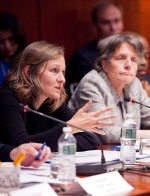As ICTJ co-hosts a discussion on complementarity on the margins of the Assembly of State Parties (ASP) of the International Criminal Court (ICC), the principle of ensuring accountability for serious crimes has seen a major breakthrough at a recent high-level meeting at Greentree. Outcomes of the meeting include proposals for a broad reference group of states to develop policy approaches to complementarity as well as the creation of a group whose role would be to develop strategies and country-specific plans on the delivery of complementarity assistance.
Such a body would comprise stakeholders from the development and rule of law fields, as well as recipient states, ICC representatives, expert organizations including the UN, and donor agencies. The aim of the group would be to ensure that plans were not only effective in delivering accountability for mass atrocities, but were developed in accordance with national development planning and in a way that helped the sustainable development of rule of law objectives.
ICTJ and the UN Development Programme, with support from the governments of Denmark and South Africa, the focal points for complementarity in the Assembly of State Parties, convened a high-level retreat on "Supporting Complementarity at the National Level" at the Greentree estate in New York December 7–9, 2011. The meeting brought together international justice actors, development practitioners, UN representatives, and national rule of law actors to discuss the practical implementation of complementarity and how to strengthen domestic systems seeking to investigate serious crimes.
Building on the first Greentree meeting held last year, the main objectives of this gathering were to foster co-ownership and coordination between development and rule of law sectors in implementing complementarity. In addition, the meeting examined progress made on complementarity in specific countries, and sought to identify contexts in which the concept might be initiated.
Using the experiences of Bosnia & Herzegovina, the Democratic Republic of Congo (DRC), Guatemala, Sierra Leone, Timor-Leste, and Uganda, the participants explored the successes and challenges met by countries which have undertaken domestic investigations and prosecutions of Rome Statute crimes—war crimes, crimes against humanity, and genocide.
In their discussion, participants identified comprehensive needs assessment that comes prior to implementing accountability efforts as essential. Such an assessment examines what expertise, capacity, and resources are available within a country for accountability measures and what assistance will be required from the international community. Discussants identified the importance of consulting national actors and engaging local experts in the needs assessment process as critical in ensuring local ownership of the process, which in turn fosters domestic support and durability of measures taken.
The importance of local ownership was elaborated in discussions examining the role justice can play in addressing mass human rights violations and serious crimes in the aftermath of the Arab Spring. An analysis of the situation in Libya emphasized that any external technical assistance must be informed by—and in accordance with—the local legal framework if it is to meet with success.
Another factor identified as being critical to the success of accountability efforts was outreach. Participants explored the transformative effect on affected populations of raising awareness about human rights and humanitarian law, instances of violations of human rights, and the efforts of judicial systems to address such violations. Discussions underscored that strategies on outreach should be developed at the outset of any judicial process to counteract inevitable challenges of misperceptions or allegations of political interference.
Furthering the discussion on the practical implementation of complementarity, discussions also explored the role the ICC and the Assembly of States Parties can play in strengthening national capacity. Participants acknowledged the constraints of limited capacity and resources at the international level, but identified key ways in which both bodies can further support efforts at the national level.
For example, the ICC can better utilize the preliminary examinations conducted by the Office of the Prosecutor as a way to encourage coordination and cooperation between the ICC and law enforcement networks in specific countries. Participants also suggested the ICC encourage states to pursue their obligation to investigate and prosecute serious crimes, and recommended increased cooperation among ASP and non-state parties to assist countries pursuing accountability for serious crimes.
The meeting concluded with the resolve to deepen the policy discussion on complementarity and to push towards a more concrete plan of action to ensure effective implementation in relevant situations. The challenges to implementing this included the need for broader political support for the complementarity agenda, as well as the need for greater coordination of assistance offered by different actors, particularly from the rule of law and development spheres.
To address the challenge of increased coordination, discussants proposed a group comprised of stakeholders from the development and rule of law fields, as well as recipient states, ICC representatives, expert organizations including the UN, and donor agencies. This group would be responsible for developing strategies and country-specific plans on the delivery of complementarity assistance. To foster increased political support, participants agreed it was important to place complementarity as a standing item on the agenda of ASP meetings and on the agenda of the General Assembly High Level Rule of Law Debate scheduled in the coming year.
ICTJ has made furthering the process of turning complementarity principle into practice an organizational priority. To this end, a panel discussion chaired by ICTJ president David Tolbert will be held on the margins of the Assembly of State Parties. Tiina Intelmann, incoming president of the Assembly of States Parties; Andries Carl Nel, deputy minister of Justice and Constitutional Development of the Republic of South Africa; Christian Friis Bach, minister for Development Cooperation of Denmark; and Jordan Ryan, assistant administrator and director of the Bureau for Crisis Prevention and Recovery of UNDP will speak at this side event titled “Supporting Complementarity at the National Level: An Integrated Approach to Rule of Law.”
To continue this discussion on advancing accountability for crimes against humanity and genocide, ICTJ has launched a special podcast series on complementarity. Listen to the podcast.
